Athens, GA Pollen and Allergy Report for Summer 2023
Pollen Allergy Trends in Athens, GA
When is pollen lowest in Athens, GA?

October
Lowest month total PPM
Avg. PPM
When is pollen highest in Athens, GA?

April
Highest month total PPM
Avg. PPM
How does pollen in Athens, GA compare to Georgia?
Athens has a higher average PPM than the state of Georgia.
Athens yearly avg PPM:
Georgia yearly avg PPM:
How does pollen in Athens, GA compare to the USA?
Athens has a higher average PPM than the USA.
Athens yearly avg PPM:
USA yearly avg PPM:
Is pollen worse this year in Athens, GA?
Spring 2023 was better than spring 2022.
Spring 2023 PPM:
Spring 2022 PPM:
Average PPM in Athens, GA
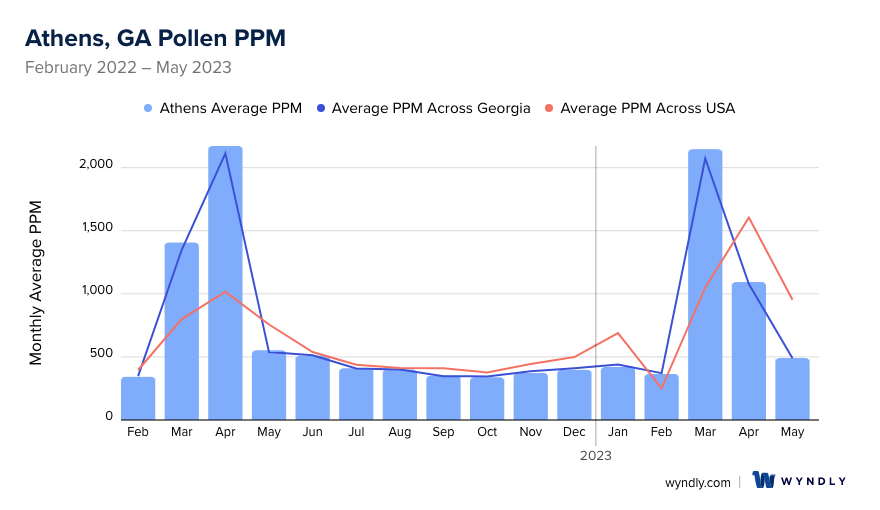
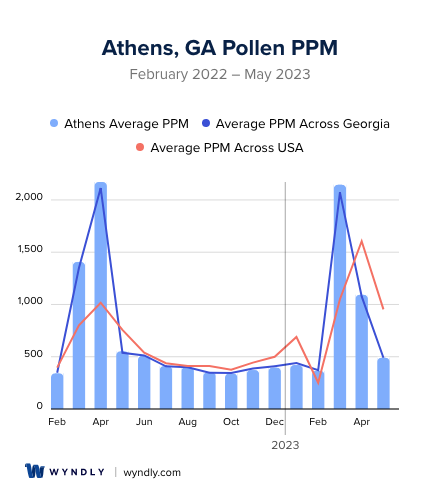
Athens, GA Pollen and Allergy Breakdown by Month
Grass
When is grass pollen highest in Athens, GA?
April has the highest grass pollen in Athens, GA with an average PPM of
When is grass pollen lowest in Athens, GA?
November has the lowest grass pollen in Athens, GA with an average PPM of
Tree
When is tree pollen highest in Athens, GA?
March has the highest tree pollen in Athens, GA with an average PPM of
When is tree pollen lowest in Athens, GA?
October has the lowest tree pollen in Athens, GA with an average PPM of
Weed
When is weed pollen highest in Athens, GA?
April has the highest weed pollen in Athens, GA with an average PPM of
When is weed pollen lowest in Athens, GA?
February has the lowest weed pollen in Athens, GA with an average PPM of
Athens, GA Pollen Monthly Breakdown by Pollen Type
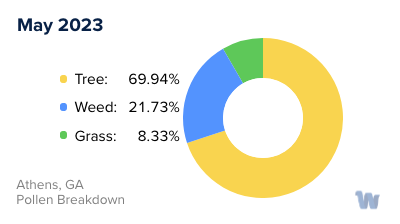
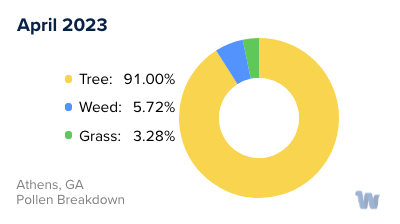
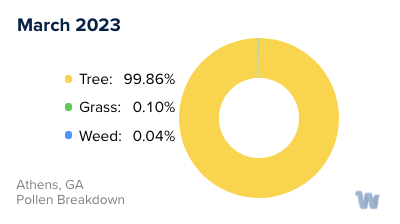
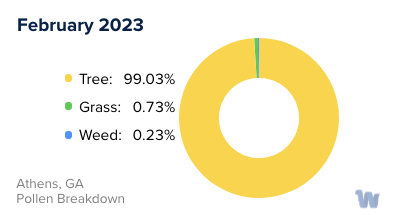
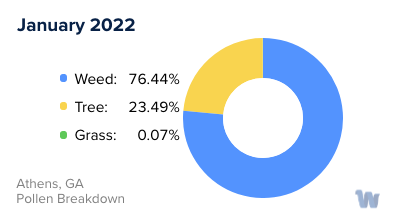
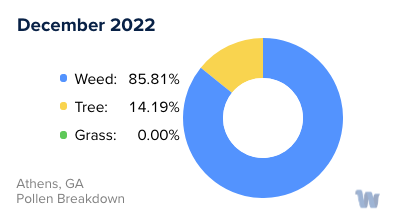
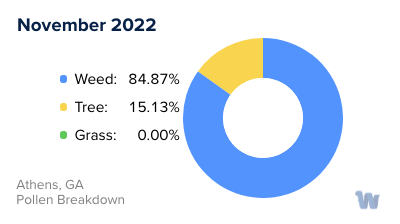
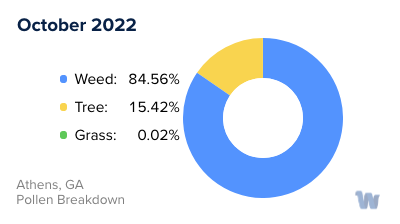
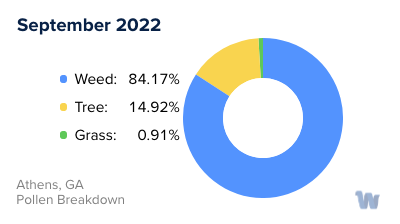
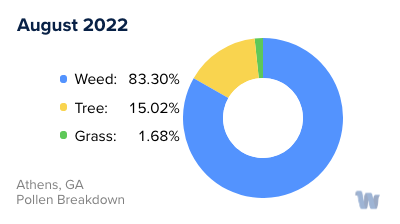
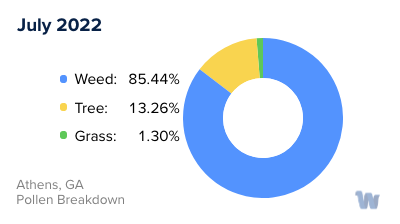
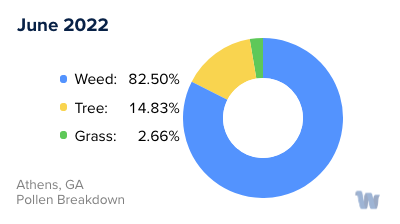
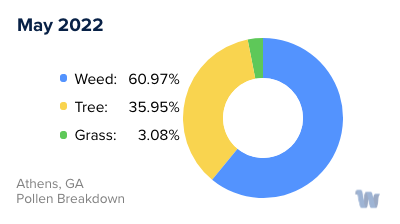
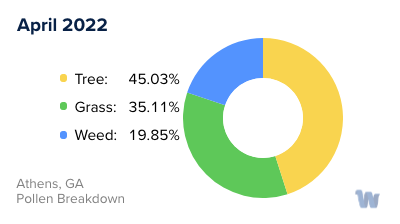
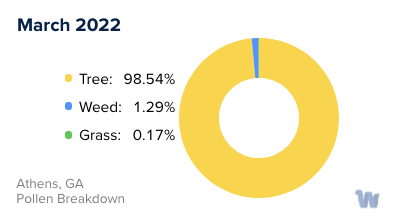
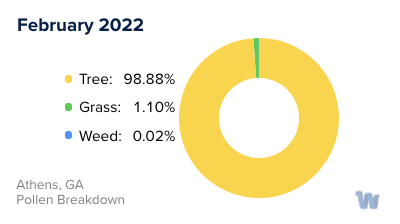
Pollen and Hay Fever in Athens, GA
In the charming city of Athens, Georgia, pollen allergies, often referred to as hay fever, are a common reality for many residents. The city's mild climate, while pleasant for outdoor activities, creates an ideal environment for the proliferation of pollen allergens. The primary producers of pollen in Athens are grasses, trees, and weeds, each releasing their pollen at different times of the year.
Tree pollen, for instance, makes its appearance in the spring, with types such as oak, juniper, elm, alder, and maple being particularly notorious. Pollen count measures, which indicate the density of pollen in the air, often show moderate to high levels during this season, impacting individuals with sensitivities to these varieties.
As we transition into the warmth of summer, grasses take the lead in pollen production. Ryegrass, Bermuda grass, and oat grass are among the most common culprits, leading to increased pollen counts and potential discomfort for those affected.
In late summer and through the fall, it's the weeds that come into focus, with ragweed, pigweed, and nettle releasing their pollen. This period, too, can be challenging for individuals with sensitivities to these types of pollen.
It's important to note that in Athens, the allergy season is longer than in many other states, often beginning in January due to the mild winter. While there's a brief respite in December, the cycle starts anew with the new year. The peak months for seasonal allergies are typically April, May, and September. During these times, residents may notice higher pollen counts and increased allergy symptoms.
Overall, while Athens is known for its beauty and vibrant community, those living or visiting should be mindful of the seasonal shifts in pollen and the potential for hay fever symptoms. Understanding these patterns can help individuals better anticipate and manage their pollen allergies, leading to a more comfortable experience in this lovely city.


